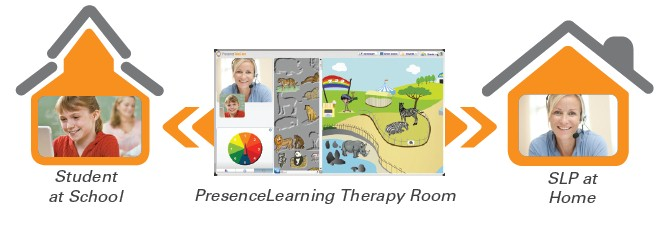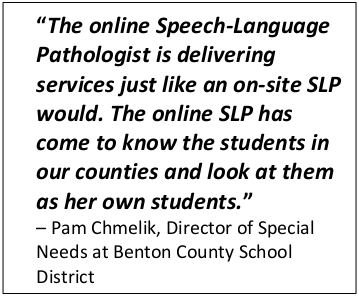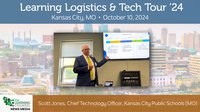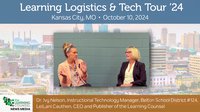Many districts struggle with delivering on the promise of special education, and the problem is only going to get worse. The average district spends an average of $51,000 per speech language pathologist (SLP) and there is always a shortage of skilled therapists for schools and fewer graduating and going into service than are retiring. Worse, the "in-person" therapist is usually driving hundreds of miles a week, criss-crossing a district repeatedly to service multiple schools and wearing themselves ragged.
Recently, the Learning Counsel met up with PresenceLearning and was impressed to hear about their success building a new delivery model of distance special education that can reduce costs and enhance outcomes for all.
Some quick facts:
-
Between 6 and 7 million US students require special ed and about half of those students currently require speech therapy. This includes children with language processing problems, autism, articulation disorders and other disabilities.
-
There are roughly 58,000 speech-language pathologists (SLPs) working in K-12 schools nationwide.
-
There is currently a shortage of 5,000-7,000 SLPs nationwide. About half of all current SLPs are expected to retire in the next decade.
Enter PresenceLearning
PresenceLearning partners with school leaders to fill in missing pieces of their Related Services for Special Education. They provide live online access to a nationwide network of Speech‑Language Pathologists (SLPs), Occupational Therapists (OTs) and other in‑demand clinicians.
They have fully qualified professionals to service students with evaluations, therapy and case management services.
How does it work? Once a district opts to fill-in their gaps with PresenceLearning, students work with clinicians "anytime anywhere" in live videoconferencing sessions that are secure and supervised. PresenceLearning clinicians customize each session using an extensive library of activities based on the latest in evidence-based practice. According to PresenceLearning, "More engagement means faster progress: PresenceLearning students make progress 22% faster than students in traditional therapy."

As PresenceLearning works to recruit, train, schedule, manage and supervise fully qualified and licensed professionals, they have also reportedly "allowed trained clinicians to 'have a life, stop traveling so much and actually have children of their own' in some instances." In addition, "scheduling student-sessions for schools is dramatically simplified."
In addition, they are really serving rural areas who may not have any trained professionals, and major metropolitan areas with local shortages or too-heavy caseloads. In some places, their service helps districts allow their full-time staff to take needed medical or family leave, or for the district to serve home-bound and medically-fragile students.
Of course, telepractice is not really a "new" thing. What's different is that with live, very-similar-to-traditional-speech-therapy video-conferencing interaction, the speech language pathologists (SLPs) can help students as if they were there and use a special system that includes content.
Benton County School District, Tennessee
Bordering the western branch of the Tennessee River, Benton County School District is located in serene and rural northwest Tennessee. The district currently serves 2,300 PreK-12 students, including approximately 500 students who receive special education services.
Benton had a majority of the special needs students with Individualized Education Plans (IEPs) requiring speech-language therapy, but due to the rural location and other conditions, the districts surrounding it had experienced a shortage of speech-language pathologists (SLPs).
"We have been fortunate in our county to maintain a level of SLPs that has been able to provide adequate services to our students," said Pam Chmelik, director of Special Needs at Benton County School District. "However, surrounding counties have been in need of specialists because of specific situations like maternity leave or Extended School Year (ESY) programs during the summer."
 "One county near us has a speech-language teacher but not a SLP," said Chmelik. "Only a licensed SLP can do the testing and the data gathering to see if a child is going to meet the eligibility standards in Tennessee to receive services." Without a fully qualified SLP on staff, schools are unable to determine which students need services.
"One county near us has a speech-language teacher but not a SLP," said Chmelik. "Only a licensed SLP can do the testing and the data gathering to see if a child is going to meet the eligibility standards in Tennessee to receive services." Without a fully qualified SLP on staff, schools are unable to determine which students need services.
To help neighboring counties find solutions to their special education needs, Benton County pursued an assistive technology grant through the state. This grant allowed the district to evaluate the surrounding counties' needs, investigate which technologies could help alleviate the issues, and share training and other services with surrounding counties.
Chmelik first became aware of online speech and language services during a conference in Nashville. With piqued interest, she began to investigate how PresenceLearning would meet the requirements of the assistive technology grant. "I thought, 'That sounds like a great avenue for rural counties, especially where there may be a larger need,'" said Chmelik.
After addressing the technical needs, Chmelik discussed the opportunity with existing staff. Then the district sent a letter to the parents of students who would be receiving the online speech therapy explaining how the process worked. Parents were also invited to observe an actual one-on-one student session. From the onset, parents were on board with this method of delivering speech-language therapy.
Benton County found the innovative technology applications to special needs provided by PresenceLearning allowed them to increase support for students. They also found that personalized online learning is more appealing to older students and helps them feel more comfortable. Some students, once they reach third or fourth grade, feel uncomfortable being pulled out of class for speech therapy.
"We had a fourth grader whose mother was about to sign him out of therapy because she felt it was separating him from other students," said Chmelik. "When we started using the assistive technology, it made him feel much more involved in his services. He now comes to speech language feeling excited about his time on the computer, instead of feeling bad about being pulled out of class."
The district has witnessed a new-found collaboration between on-site SLPs and the online SLPs. The PresenceLearning SLPs even offer to attend the students' IEP meetings by phone or online. The district has also commented that the sessions are more interactive than expected.
"Online speech language programs are not a canned box where students push a keyboard key to answer questions," said Chmelik. "The online SLP is delivering live services just like an on-site SLP would. The online SLP has come to know the students in our counties and look at them as her own students."
Affordability
The Learning Counsel found these other districts are also using PresenceLearning services for a range of reasons, some of them having to do with being able to deliver services affordably.
-
Sparta Area School District (WI)
-
Union County School District (GA)
-
Groton Public Schools (CT)
-
Los Angeles Unified School District SELPA (CA)
-
Fowler Unified School District (CA)
-
Capital Area Intermediate Unit (PA)
-
Aspire Public Charter Schools (CA)
-
Leadership Public Charter Schools (CA)
-
Mountain Peak Charter School (CA)
-
Harrison County District (CO)
PresenceLearning's approach to speech-language therapy, occupational therapy and other live services delivered via the web are an alternate means offering high engagement for students at an affordable price. In addition, PresenceLearning has gathered together 50 published, peer‑reviewed studies confirming that online therapy produces outcomes that are as good as standard face‑to-face therapy.
Online speech therapy and occupational therapy are recognized as effective by major organizations including the American Speech-Language- Hearing Association (ASHA), the American Occupational Therapy Association (AOTA), the Mayo Clinic and the American Telemedicine Association (ATA).
Most interesting to the Learning Counsel was our discovery that one of the founders of PresenceLearning has a personal interest in helping students nationally because he has a family member with special needs and an honest reality on how really well delivered therapies can change lives.
Thank you Clay Whitehead for this interesting service, and thank you as well to the other staff and hard workers of PresenceLearning!











